Abstract
1. Acute administration of the specific serotonin uptake inhibitor, fluvoxamine (100 mg at 16.00 h), markedly increased nocturnal plasma melatonin concentrations, with high levels extending into the morning hours. 2. Acute administration of the noradrenaline uptake inhibitor, desipramine (DMI) (100 mg at 16.00 h), increased evening plasma melatonin concentrations. 3. Both drug treatments increased the duration of melatonin secretion, fluvoxamine significantly delaying the offset time and DMI significantly advancing the onset time. 4. The stimulatory effect of DMI on plasma melatonin was mirrored by increased urinary 6-sulphatoxymelatonin (aMT6s) excretion. 5. On the contrary, there was no correlation between plasma melatonin and urinary aMT6s concentrations following fluvoxamine treatment, suggesting that fluvoxamine may inhibit the metabolism of melatonin. 6. Treatment with DMI increased plasma cortisol concentrations in the evening and early morning, treatment with fluvoxamine increased plasma cortisol at 03.00 h, 10.00 h and 11.00 h. 7. The drug treatments affected different aspects of the nocturnal plasma melatonin profile suggesting that the amplitude of the melatonin rhythm may depend upon serotonin availability and/or melatonin metabolism whilst the onset of melatonin production depends upon noradrenaline availability.
Full text
PDF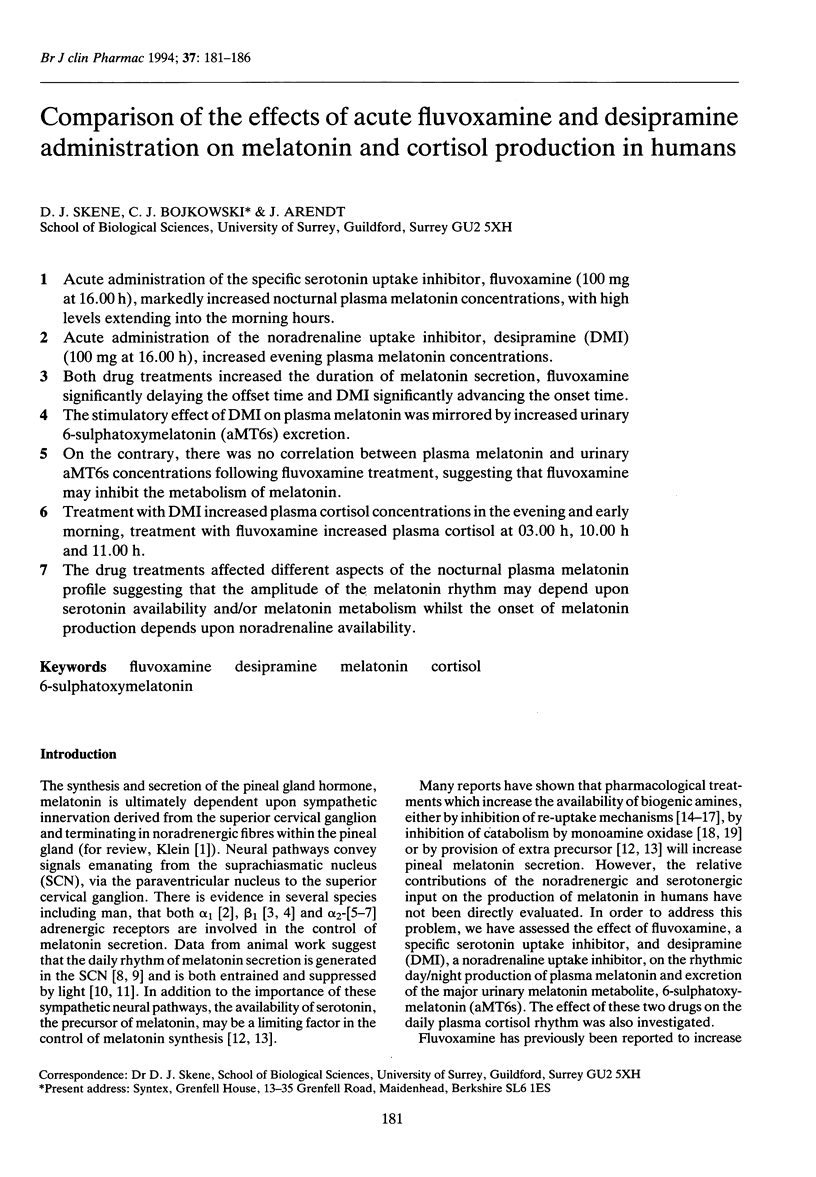
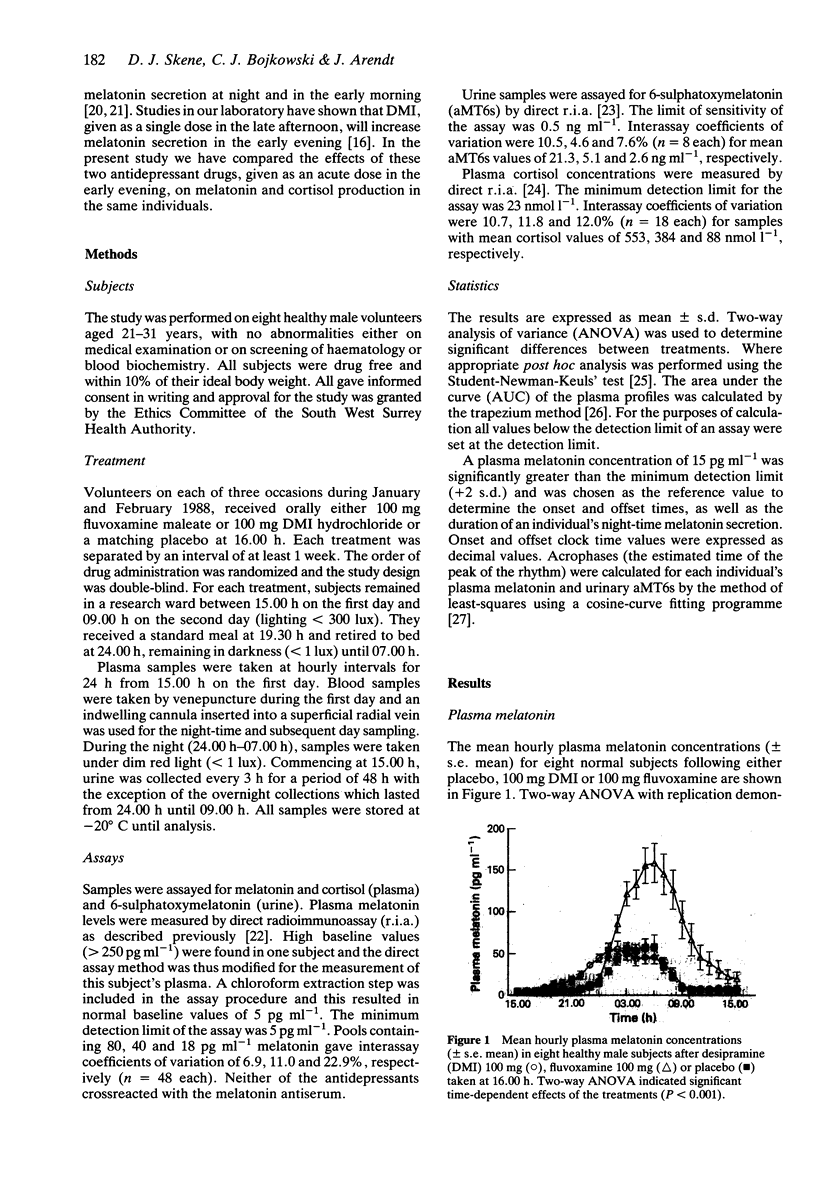
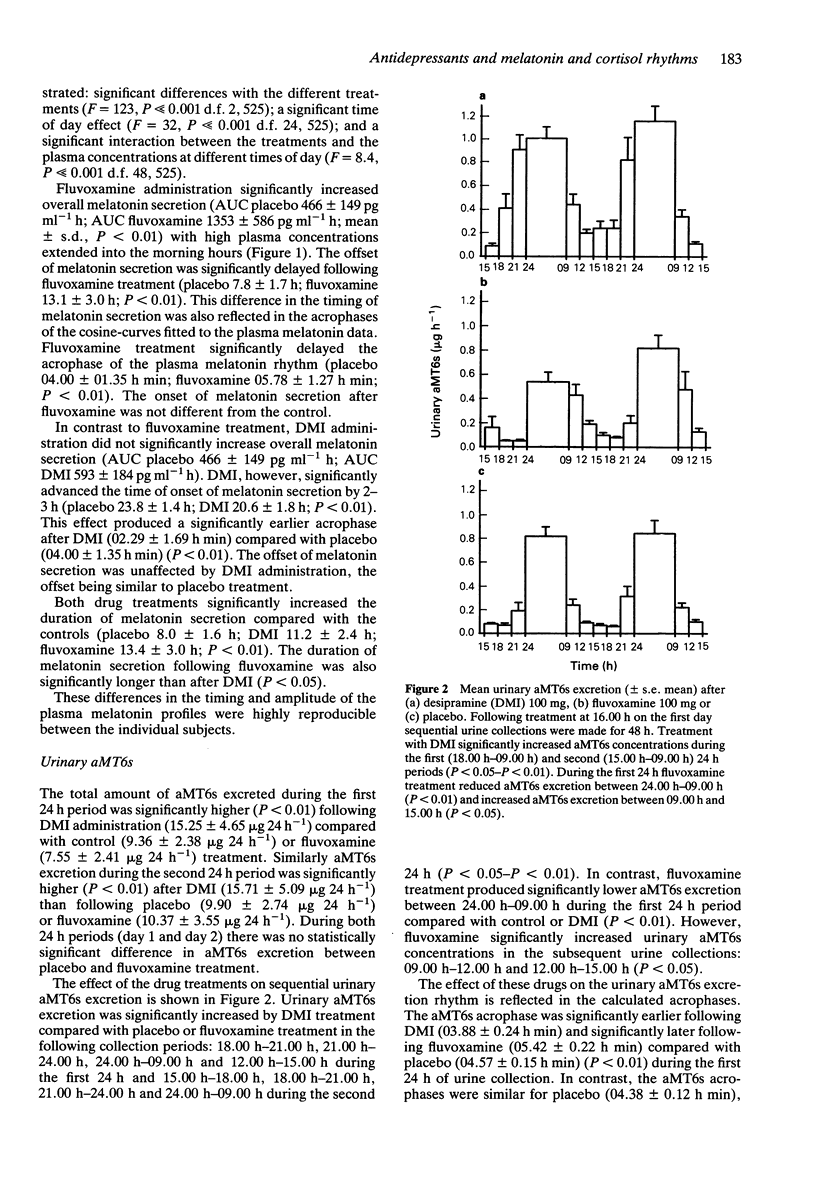
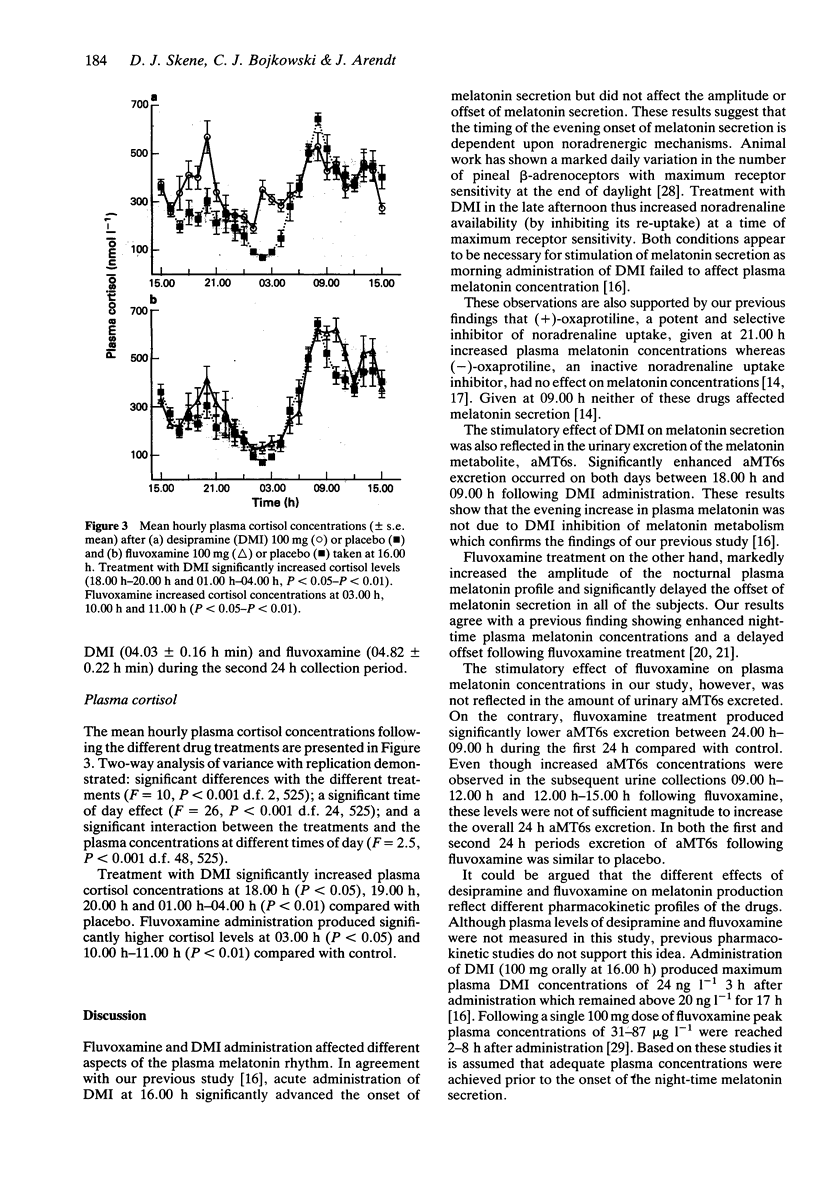
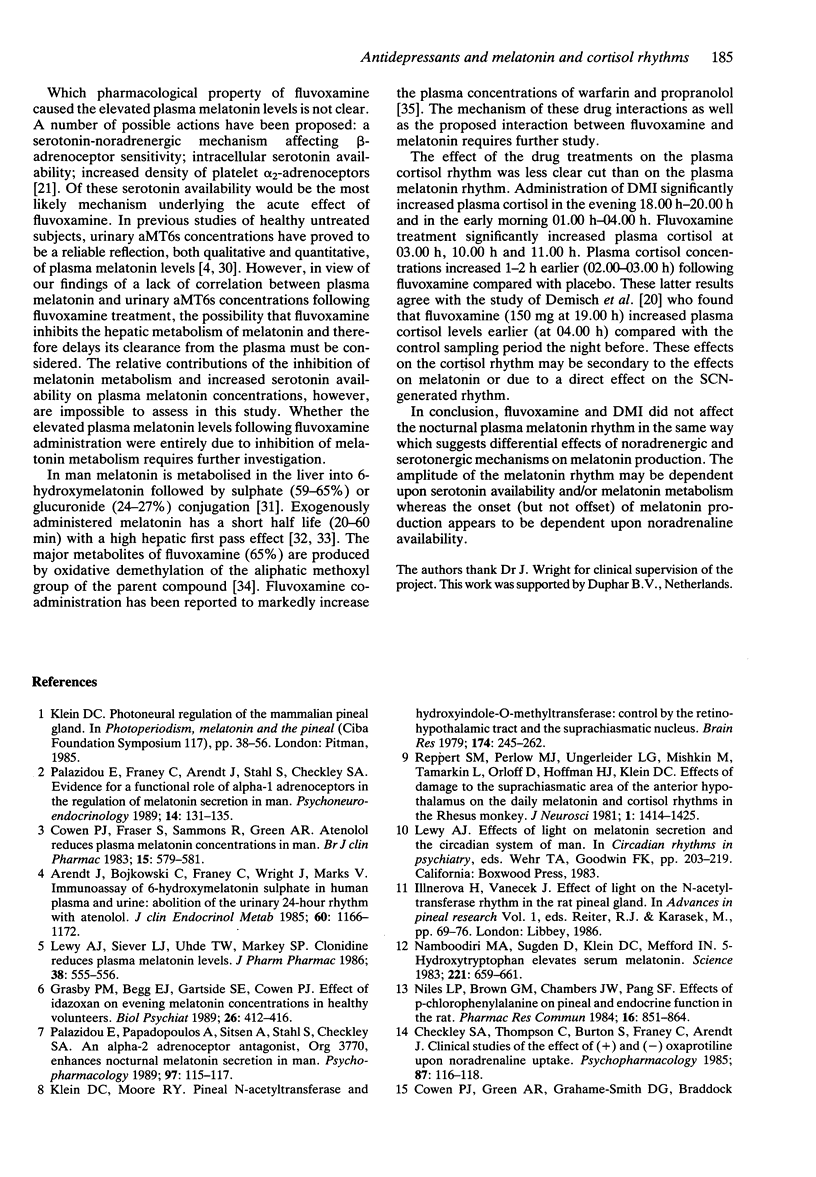
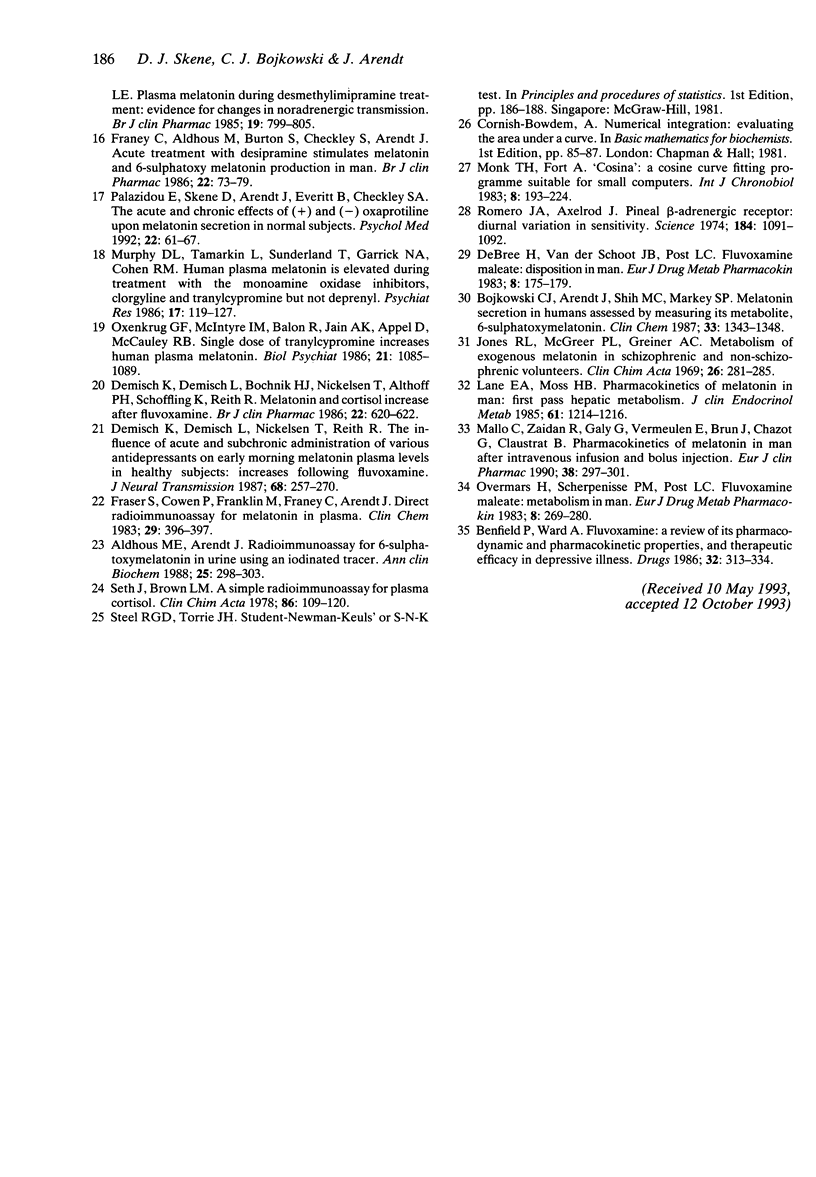
Selected References
These references are in PubMed. This may not be the complete list of references from this article.
- Aldhous M. E., Arendt J. Radioimmunoassay for 6-sulphatoxymelatonin in urine using an iodinated tracer. Ann Clin Biochem. 1988 May;25(Pt 3):298–303. doi: 10.1177/000456328802500319. [DOI] [PubMed] [Google Scholar]
- Arendt J., Bojkowski C., Franey C., Wright J., Marks V. Immunoassay of 6-hydroxymelatonin sulfate in human plasma and urine: abolition of the urinary 24-hour rhythm with atenolol. J Clin Endocrinol Metab. 1985 Jun;60(6):1166–1173. doi: 10.1210/jcem-60-6-1166. [DOI] [PubMed] [Google Scholar]
- Benfield P., Ward A. Fluvoxamine. A review of its pharmacodynamic and pharmacokinetic properties, and therapeutic efficacy in depressive illness. Drugs. 1986 Oct;32(4):313–334. doi: 10.2165/00003495-198632040-00002. [DOI] [PubMed] [Google Scholar]
- Bojkowski C. J., Arendt J., Shih M. C., Markey S. P. Melatonin secretion in humans assessed by measuring its metabolite, 6-sulfatoxymelatonin. Clin Chem. 1987 Aug;33(8):1343–1348. [PubMed] [Google Scholar]
- Checkley S. A., Thompson C., Burton S., Franey C., Arendt J. Clinical studies of the effect of (+) and (-)-oxaprotiline upon noradrenaline uptake. Psychopharmacology (Berl) 1985;87(1):116–118. doi: 10.1007/BF00431790. [DOI] [PubMed] [Google Scholar]
- Cowen P. J., Fraser S., Sammons R., Green A. R. Atenolol reduces plasma melatonin concentration in man. Br J Clin Pharmacol. 1983 May;15(5):579–581. doi: 10.1111/j.1365-2125.1983.tb02099.x. [DOI] [PMC free article] [PubMed] [Google Scholar]
- Cowen P. J., Green A. R., Grahame-Smith D. G., Braddock L. E. Plasma melatonin during desmethylimipramine treatment: evidence for changes in noradrenergic transmission. Br J Clin Pharmacol. 1985 Jun;19(6):799–805. doi: 10.1111/j.1365-2125.1985.tb02717.x. [DOI] [PMC free article] [PubMed] [Google Scholar]
- Demisch K., Demisch L., Bochnik H. J., Nickelsen T., Althoff P. H., Schöffling K., Rieth R. Melatonin and cortisol increase after fluvoxamine. Br J Clin Pharmacol. 1986 Nov;22(5):620–622. doi: 10.1111/j.1365-2125.1986.tb02947.x. [DOI] [PMC free article] [PubMed] [Google Scholar]
- Demisch K., Demisch L., Nickelsen T., Rieth R. The influence of acute and subchronic administration of various antidepressants on early morning melatonin plasma levels in healthy subjects: increases following fluvoxamine. J Neural Transm. 1987;68(3-4):257–270. doi: 10.1007/BF02098502. [DOI] [PubMed] [Google Scholar]
- Franey C., Aldhous M., Burton S., Checkley S., Arendt J. Acute treatment with desipramine stimulates melatonin and 6-sulphatoxy melatonin production in man. Br J Clin Pharmacol. 1986 Jul;22(1):73–79. doi: 10.1111/j.1365-2125.1986.tb02882.x. [DOI] [PMC free article] [PubMed] [Google Scholar]
- Fraser S., Cowen P., Franklin M., Franey C., Arendt J. Direct radioimmunoassay for melatonin in plasma. Clin Chem. 1983 Feb;29(2):396–397. [PubMed] [Google Scholar]
- Grasby P. M., Begg E. J., Gartside S. E., Cowen P. J. Effect of idazoxan on evening melatonin plasma concentrations in healthy volunteers. Biol Psychiatry. 1989 Aug;26(4):412–416. doi: 10.1016/0006-3223(89)90058-9. [DOI] [PubMed] [Google Scholar]
- Jones R. L., McGeer P. L., Greiner A. C. Metabolism of exogenous melatonin in schizophrenic and non-schizophrenic volunteers. Clin Chim Acta. 1969 Nov;26(2):281–285. doi: 10.1016/0009-8981(69)90379-9. [DOI] [PubMed] [Google Scholar]
- Klein D. C., Moore R. Y. Pineal N-acetyltransferase and hydroxyindole-O-methyltransferase: control by the retinohypothalamic tract and the suprachiasmatic nucleus. Brain Res. 1979 Oct 5;174(2):245–262. doi: 10.1016/0006-8993(79)90848-5. [DOI] [PubMed] [Google Scholar]
- Klein D. C. Photoneural regulation of the mammalian pineal gland. Ciba Found Symp. 1985;117:38–56. doi: 10.1002/9780470720981.ch4. [DOI] [PubMed] [Google Scholar]
- Lane E. A., Moss H. B. Pharmacokinetics of melatonin in man: first pass hepatic metabolism. J Clin Endocrinol Metab. 1985 Dec;61(6):1214–1216. doi: 10.1210/jcem-61-6-1214. [DOI] [PubMed] [Google Scholar]
- Lewy A. J., Siever L. J., Uhde T. W., Markey S. P. Clonidine reduces plasma melatonin levels. J Pharm Pharmacol. 1986 Jul;38(7):555–556. doi: 10.1111/j.2042-7158.1986.tb04639.x. [DOI] [PubMed] [Google Scholar]
- Mallo C., Zaidan R., Galy G., Vermeulen E., Brun J., Chazot G., Claustrat B. Pharmacokinetics of melatonin in man after intravenous infusion and bolus injection. Eur J Clin Pharmacol. 1990;38(3):297–301. doi: 10.1007/BF00315035. [DOI] [PubMed] [Google Scholar]
- Murphy D. L., Tamarkin L., Sunderland T., Garrick N. A., Cohen R. M. Human plasma melatonin is elevated during treatment with the monoamine oxidase inhibitors clorgyline and tranylcypromine but not deprenyl. Psychiatry Res. 1986 Feb;17(2):119–127. doi: 10.1016/0165-1781(86)90067-3. [DOI] [PubMed] [Google Scholar]
- Namboodiri M. A., Sugden D., Klein D. C., Mefford I. N. 5-hydroxytryptophan elevates serum melatonin. Science. 1983 Aug 12;221(4611):659–661. doi: 10.1126/science.6867734. [DOI] [PubMed] [Google Scholar]
- Niles L. P., Brown G. M., Chambers J. W., Pang S. F. Effects of P-chlorophenylalanine on pineal and endocrine function in the rat. Pharmacol Res Commun. 1984 Sep;16(9):851–864. doi: 10.1016/s0031-6989(84)80022-3. [DOI] [PubMed] [Google Scholar]
- Overmars H., Scherpenisse P. M., Post L. C. Fluvoxamine maleate: metabolism in man. Eur J Drug Metab Pharmacokinet. 1983 Jul-Sep;8(3):269–280. doi: 10.1007/BF03188757. [DOI] [PubMed] [Google Scholar]
- Oxenkrug G. F., McIntyre I. M., Balon R., Jain A. K., Appel D., McCauley R. B. Single dose of tranylcypromine increases human plasma melatonin. Biol Psychiatry. 1986 Sep;21(11):1085–1089. doi: 10.1016/0006-3223(86)90292-1. [DOI] [PubMed] [Google Scholar]
- Palazidou E., Franey C., Arendt J., Stahl S., Checkley S. Evidence for a functional role of alpha-1 adrenoceptors in the regulation of melatonin secretion in man. Psychoneuroendocrinology. 1989;14(1-2):131–135. doi: 10.1016/0306-4530(89)90062-0. [DOI] [PubMed] [Google Scholar]
- Palazidou E., Papadopoulos A., Sitsen A., Stahl S., Checkley S. An alpha 2 adrenoceptor antagonist, Org 3770, enhances nocturnal melatonin secretion in man. Psychopharmacology (Berl) 1989;97(1):115–117. doi: 10.1007/BF00443424. [DOI] [PubMed] [Google Scholar]
- Palazidou E., Skene D., Arendt J., Everitt B., Checkley S. A. The acute and chronic effects of (+) and (-) oxaprotiline upon melatonin secretion in normal subjects. Psychol Med. 1992 Feb;22(1):61–67. doi: 10.1017/s0033291700032736. [DOI] [PubMed] [Google Scholar]
- Reppert S. M., Perlow M. J., Ungerleider L. G., Mishkin M., Tamarkin L., Orloff D. G., Hoffman H. J., Klein D. C. Effects of damage to the suprachiasmatic area of the anterior hypothalamus on the daily melatonin and cortisol rhythms in the rhesus monkey. J Neurosci. 1981 Dec;1(12):1414–1425. doi: 10.1523/JNEUROSCI.01-12-01414.1981. [DOI] [PMC free article] [PubMed] [Google Scholar]
- Romero J. A., Axelrod J. Pineal beta-adrenergic receptor: diurnal variation in sensitivity. Science. 1974 Jun 7;184(4141):1091–1092. doi: 10.1126/science.184.4141.1091. [DOI] [PubMed] [Google Scholar]
- Seth J., Brown L. M. A simple radioimmunoassay for plasma cortisol. Clin Chim Acta. 1978 May 16;86(1):109–120. doi: 10.1016/0009-8981(78)90465-5. [DOI] [PubMed] [Google Scholar]



